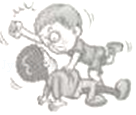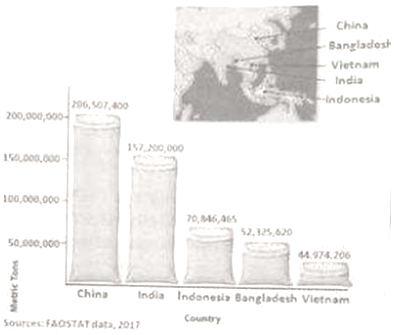Mr father woke me up early one summer morning when I was fourteen and announced(宣布): “Get up, you’re going with me to cut the grass in the garden.”
The idea that my father thought I was old enough to help him in his business made me feel proud and excited. From sunup to sundown, my father, my younger brother and I worked in the large garden. By the end of the day I was too tired to say a word but I felt good. This was my first time to help my father in his business. I got $ 6 for my work that day.
One day my father found some leaves I had missed and pulled me aside. “Take away these leaves!” he said, “and don’t make me have to tell you to do it again.” The message was clear. Today I value(珍视) the importance of doing a job well the first time. It will never fail to impress(给……留下印象) the person you are working for.
After two years, my father told me and my brother that he felt we were old enough to cut the grass by ourselves. Every Saturday during my last two years of high school, we set off early in the morning with the same strong wish we had gained while working under our father.
Looking after the garden was neither exciting nor high paying, but that didn’t matter. It taught me that any job was a good job and that whatever I was paid was more than I had before.
A newspaper reporter once asked me how someone could possibly live with hard work and low pay. “If you’re only thinking about hard work and money, you probably don’t want to do any better than you are doing.” I answered. In every job, from cutting the grass to washing dishes, I’ve learned much. I’ve learned something that helps me in my next job.
If you work hard enough, you can learn from any job you do.The writer felt proud and cited when he was asked to cut the grass because he thought __________.
| A.he could cut the grass himself |
| B.he could make much money |
| C.he could enjoy sunup and sundown |
| D.he could help his family |
The word “message” in the passage probably refers to(指) __________.
| A.not leaving leaves behind |
| B.giving no excuse for your mistakes |
| C.doing a good job at the very beginning |
| D.missing things which can be found out |
When the writer finished high school, maybe he was __________ years old.
| A.fourteen | B.eighteen | C.twenty | D.twenty-two |
Which of the following does the writer probably think is the most important?
| A.Keeping learning from any job you had. |
| B.Asking no money for work. |
| C.Finishing work as quickly as possible. |
| D.Keeping looking for different jobs. |
The writer probably thinks his father is __________.
| A.lazy | B.helpful | C.careless | D.funny |
Many children today live in unsafe places. They may live where wars have been fought or where there is a lot of crimes. Play for Peace is an organization formed to help these children. It does so by bringing kids and adults. For what? To make a more peaceful world.
Places where Play for Peace works include Northern Ireland, India, and Germany. Kids from different backgrounds come together to play games. Some of the games encourage them to work together and to learn about one another. While playing, kids begin to understand their different ways of thinking and doing things.
As kids in the program get older. Play for Peace teaches them to be leaders. They become advisers. The older kids lead the games for the younger kids. One leader called Mandeep from a small village in India described her experience. " I didn't realize there was a larger world until I joined Play for Peace…It was a big challenge for me. But I grew to feel safe and like them even though they were different from me. "
Play for Peace works because it brings kids together. They have fun and learn how to get along. Many kids who take part find that they have much in common﹣ and they become friends!
(1)What organization is the passage about?
A. Project Hope.
B. ORBIS.
C. Play for Peace.
D. UNICEF.
(2)What is the main purpose of the organization?
A. To make the world more peaceful.
B. To bring kids and adults together.
C. To teach older kids to lead games for younger ones.
D. To make children understand different ways of thinking.
(3)What did Mandeep think of her experience in the program?
A. Common but comfortable.
B. Tiring but interesting.
C. Challenging but meaningful.
D. Dangerous but unusual.
(4)Why does the author write this passage?
A. To encourage kids to runaway from wars.
B. To explain the importance of playing games.
C. To tell kids how to get along with each other.
D. To introduce a charitable organization to readers.

Bullying can happen to me or you or anybody, but there are things that we can all do to help.
What is bullying?
Bullying is when someone makes you feel bad or hurts you again and again. Bullying can happen at school or out of school or online. Bullying includes:
• calling people unkind names
• laughing at people
• taking someone's things without being allowed
• not letting someone play in a group
• hitting people
What is cyberbullying?
Cyberbullying happens online and includes:
• sending unkind messages
• sharing photos without permission
• not letting someone be part of an online group
What can you do?
If someone is mean to you, tell an adult that you know or like. For example, talk to a parents or a teacher. You can block a person who sends mean message online. Don't reply.
Talk to your parents or teachers or an adult you know well if you see bullying or if you are worried about a friend.
Say sorry if you're mean to someone. You can write a message or talk to the person. Think about how to be kind in the future.
We can all help to say no to bullying.
(1)Which type of bullying is the picture about?
A. Laughing at people.
B. Telling lies about people.
C. Not letting someone play in a group.
D. Hitting people.
(2)What can you do if you are bullied online?
A. Turn to your parents or teachers for help.
B. Write back and try to make more friends.
C. Keep the problems and worries to yourself.
D. Tell strangers about the harm of cyberbullying.
(3)Which can be the best title for this passage?
A. Bullying is everywhere
B. Say no to bullying
C. Keep away from cyberbullying
D. Say sorry to people who are bullied

Along with wheat, rice is one of the most important food crops in the world. It is a nutritious, healthy food.
Each year, farmers grow millions of tons of rice.
Top Five Rice﹣ producing Countries

(1)What food crop is the reading material mainly about?
A. Wheat.
B. Rice.
C. Corn.
D. Potato.
(2)In which country is the most rice grown?
A. China.
B. Bangladesh.
C. India.
D. Vietnam.
(3)From the map we know that the five countries are all in .
A. Europe.
B. Africa.
C. America.
D. Asia.
The face﹣down generation(一代)
If you were born in the 2000s, you are called the oh﹣ohs. The 21st century. That would make you young, creative, connected, world﹣wide, and no doubt smart. Maybe good﹣looking, too. Right? But what do other people think about your generation?
Some adults worry that you're more interested in the screen in front of you than the world around you. They think of you as the "face﹣down generation" because you use your phone so much. They wonder how you will deal with school, friends, and family.
Other adults worry that today's youth are spoilt(溺爱)and don't want to face the challenges of adult life. Many children born in the 1990s and 2000s were raised by "helicopter parents". They were always there to guide and help their children with a busy program filled with homework and after﹣school activities such as dancing, drawing, or sports. With parents who do everything for them, today's youth seem to prefer to live like teenagers even when they are in their 20s or 30s.
Does the face﹣down generation need a heads﹣up? Well, probably not. The fact.is that many of today's teenagers are better educated and more creative than past generations. They seem to be willing to become leaders. More young people than ever volunteer to help their communities. There are also brave young people such as Malala Yousafzai, the teenager who won the 2014 Nobel Peace Prize for pushing girls' rights to go to school.
So if you're one of the oh﹣ohs, there's reason to be hopeful about the future. Things are looking up for the face﹣down generation. Chances are that you do great and laugh out loud.
(1)If Alice was born in 2004, is she an oh﹣oh?
(2)Why do some adults think of the oh﹣ohs as the "face﹣down generation"?
(3)What are the parents called who always guide and plan everything for their children?
(4)How does the writer organize Paragraph 4?
A. Time order.
B. Space order.
C. General to specific.
D. Specific to general.
(5)What does the writer encourage the oh﹣ohs to do? Please list TWO.
My name is Wei Hua and I'm a sporting robot of the 23rd century. I'm clever at high flying exercises. I jump from spaceships and as I fall, I turn, dive, circle and dance until I softly land as close as I can to the finishing line.Robot competitions in the 23rd century are truly a popular sport. Fans from all over China watch their hand﹣held TVs when a competition comes on. Last time I took part in the 78th Olympics and I won the silver medal for my performance.
This year I was very proud to be chosen again. I wanted to meet robots from other countries and explore ideas about our sport. However, my programmer fell ill the week before we were leaving. It was very painful for her and I felt very scared. I didn't feel so confident that I would win.
The day of the competition was rather cold for my legs and my special oil began to freeze. I stopped for a moment(which I shouldn't)before I jumped from the starting place on a little spaceship, then I began my performance. At the correct moment I tried to open my parachute(降落伞)but there was a problem. It only opened a little. I began to fall faster and faster so that I could not turn, dive, circle or dance. My heart stopped beating as I landed heavily on a mountain covered with snow.
This is why I am writing to you from my hospital bed with two broken legs and a weak head. I did not win anything at the Olympics after all. I need the factory to build me two new legs and an even bigger head. Then I will be able to compete once more. Let's hope for greater success in the next Olympics!
(1)Wei Hua finished in the 78th Olympics high flying sport.
A. first
B. second
C. third
D. fourth
(2)Why didn't Wei Hua feel so confident about himself before this year's game?
A. His programmer was sick.
B. He had a great pain in his leg.
C. He himself fell ill before they were leaving.
D. He couldn't meet robots from other countries.
(3)According to Paragraph 3, how many reasons led to Wei Hua's failure in the competition?
A. One.
B. Two.
C. Three.
D. Four.
(4)How is Wei Hua feeling now?
A. Full of hope.
B. Unsure about himself.
C. Heart﹣broken.
D. Satisfied with his result this year.